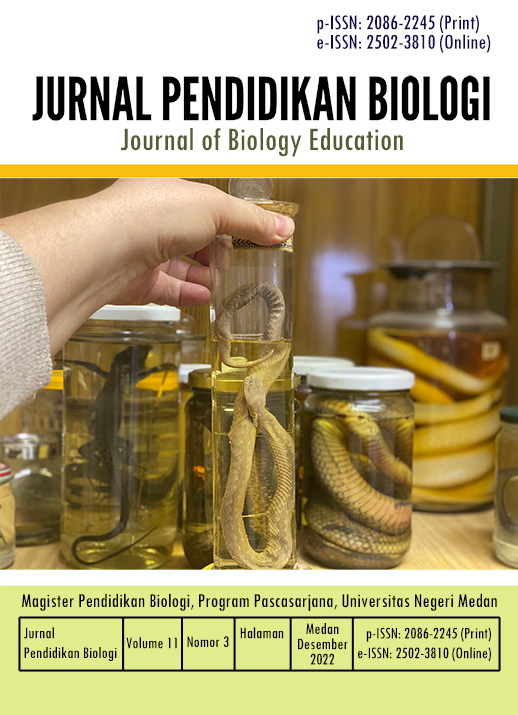Effect of Duration of Social Media Use on Biology Education Students' GPA
DOI:
https://doi.org/10.24114/jpb.v11i3.35095Keywords:
Academic achievement, Biology education, GPA, Education, Social media.Abstract
Social media is no longer a foreign thing, especially for the millennial generation of students. Social media is used as a necessity and a means of communication. This type of research is quantitative research with a descriptive method that aims to provide or create an overview of the effect of the duration of using social media on the GPA of Biology Education Students. This research can be regarded as quantitative research because it collects and processes data using numbers, interprets the data obtained, and is also in the stage of presenting the output. The data in this study were obtained from the respondents' answers in filling out the questionnaire (closed questionnaire) and using the Likert scale in determining the score. 20 respondents were selected using the convenience sampling technique. The conclusion is that the effect of the duration of using social media on the GPA of the students of the Biology Education Study Program of UIN Sunan Kalijaga Yogyakarta is not significant. This is reinforced by the results of the R Square analysis which is 0.002 means only 1.2%. Through these results, it can be seen that the effect of the duration of social media on the GPA of biology education students only has an effect of 1.2% and the rest is influenced by other variabels not explained in this study. The benefit of this research for science is to determine the impact of the development of technology and information on academic potential, especially for education students at Sunan Kalijaga State Islamic University, Yogyakarta.References
Akramunnisa, & Hardiana. (2021). Efektivitas Pembelajaran Daring Menggunakan Google Classroom pada Mata Kuliah Logika Informatika. Jurnal Literasi Digital, 1(2), 102“107.
APJII. (2015). Profil pengguna internet Indonesia, Asosiasi Penyelenggara Jasa Internet Indonesia.
Chairiyanti, L., R. (2013). Hubungan antar Self-efficacy Akademik dan Konsep Diri Akademik dengan Prestasi Humanior, 4(2), 1125-1133.
Febri, T. (2015). Pengaruh Media Sosial Terhadap Prestasi Belajar Siswa Pada Pelajaran Pai Kelas XI di SMA Negeri 1 Sukoharjo TP 2014/2015 (Universitas Muhammadiyah Metro.).
Fitria. (2018). Pendeteksian Heteroskedastisitas Pada Analisis Regresi. Journal of Chemical Information and Modeling, 53(9), 1689“1699.
Fitri, M. E. Y. (2019). Penggunaan Media Sosial Berdasarkan Perilaku Belajar Terhadap Ipk. Jurnal Benefita, 4(3), 507. https://doi.org/10.22216/jbe.v4i3.4612
Fitri, S. (2013). Dampak Positif dan Negatif Sosial Media Terhadap Perubahan Sosial Anak.
Irwandani & Juariyah, S. (2016). Pengembangan Media Pembelajaran Berupa Komik Fisika Berbantuan Sosial Media Instagram Sebagai Alternatif Pembelajaran. Jurnal Ilmiah Pendidikan Fisika Al-BiRuNi, 5(11), 33“42.
https://doi.org/https://doi.org/10.24042/jpif albiruni.v5i1.103
Juliasari, N. &. (2016). Hubungan Antara Manajemen Waktu Belajar, Motivasi Belajar, Dan Fasilitas Belajar Dengan Prestasi Belajar Matematika Siswa SMP Kelas VIIseKecamatan Danurejan Yogyakarta. UNION : Jurnal Pendidikan Matematika, 4(3), 405“411.https://doi.org/v4i3.435.
Kandell, J. (1998). Internet addiction on campus: The vulnerability of college students. CyberPsychology & Behavior, 1(1), 11“17. doi.org/10.1089/cpb.1998.1.11.
Khumaidi, K. &. (2014). Pengaruh Kecerdasan Intelektual IQ, cara belajar dan kreativitas guru dalam pembelajaran Terhadap Prestasi Belajar Ekonomi SiswaAnalysis Journal, 3(2), 307“310.
Kirschner, Paul A & Karpinski, A. (2010). Facebook and Academic Performance. Journal Computers in Human Behavior, 26(6), 1237“1245.https://doi.org/doi : https://doi.org/10.1016/j.chb.2010.03.024
Lestari, M. (2016). Hubungan Penggunaan Jejaring Sosial Facebook Dengan Prestasi Belajar Mahasiswa Universitas Tribuwana Tunggadewi Malang Program Studi Ilmu Keperawatan Angkatan 2012. Jurnal Ilmiah Mahasiswa Keperawatan. Jurnal Ilmiah Mahasiswa Keperawatan, 1(2), 94“100.
Marcus, G. L., Wattimanela, H. J., & Lesnussa, Y. A. (2012). Analisis Regresi Komponen Utama Untuk Mengatasi Masalah Multikolinieritas Dalam Analisis Regresi Linier Berganda. BAREKENG: Jurnal Ilmu Matematika Dan Terapan, 6 (1), 31“40. https://doi.org/10.30598/barekengvol6iss1pp31-40.
Maya, N. (2015). Fenomena Cyberbullying di Kalangan Pelajar. Jurnal Ilmu Sosial Dan Politik, 4(3), 443“450.
Pramudawardani, A. P. (2016). Pengaruh Intensitas Penggunaan Jejaring Sosial Facebook dan Twitter Terhadap Prestasi Belajar Mahasiswa Pendidikan IPS (Universitas Negeri Yogyakarta).
Rahadi, D. R. (2017). Perilaku Pengguna Dan Informasi Hoax Di Media Sosial. Jurnal Manajemen & Kewirausahaan, 5(1), 58“ 69.
https://doi.org/https://doi.org/10.26905/jm dk.v5i1.1342.
Ramdhani, M. (2016). Pengaruh Sosial Media (Facebook) Terhadap Prestasi Belajar Mahasiswa Ilmu Komunikasi Universitas Singaperbangsa (UNSIKA) Karawang. Jurnal Politikom Indonesiana, 1(1), 66“78.
Saleh, M. (2014). Pengaruh Motivasi, Faktor Keluarga, Lingkungan Kampus dan Aktif Berorganisasi Terhadap Prestasi Akademik. Jurnal Phenomhenon, 4(2),109“141. https://doi.org/http://dx.doi.org/10.21580/phen.2014.4.2.122.
Sawiji. (2008). Pendampingan materi kewarganegaraan: Penerbit Agung.
Siswanto, T. (2013). Optimalisasi Sosial Media Sebagai Media Pemasaran Usaha Kecil Menengah. Jurnal Liquidity, 2(1), 80“86. https://doi.org/https://doi.org/10.32546/lq.v2i1.134.
Sobur, A. (2006). Semiotika Komunikasi, Bandung: Remaja Rosdakarya Analisis Teks Media Suatu Pengantar untuk Analisa Wacana, Analisis Semiotik, dan Analisis framing, Bandung: PT Remaja Rosdakarya.
Syilfi, Dwi,I., Diah, S. (2012). Analsis Regresi. Jurnal Gaussin, 1.
Widodo, T. (2016). Pengaruh Kelengkapan Produk dan Kualitas Pelayanan Terhadap Keputusan Pembelian (Studi Kasus Pada Swalayan Ada Baru di Kota Salatiga). Among Makarti, 9(1).
Downloads
Published
Issue
Section
License
Copyright (c) 2022 Jurnal Pendidikan Biologi

This work is licensed under a Creative Commons Attribution 4.0 International License.
Copyright
Penyerahan naskah menyiratkan bahwa karya yang diserahkan belum pernah diterbitkan sebelumnya (kecuali sebagai bagian dari tesis, laporan, atau abstrak). Naskah tidak dipertimbangkan untuk publikasi di tempat lain. Penerbitannya telah disetujui oleh semua penulis bersama. Jika dan kapan naskah diterima untuk publikasi, penulis masih memegang hak cipta dan mempertahankan hak penerbitan tanpa batasan. Penulis atau orang lain diperbolehkan untuk melipatgandakan artikel selama tidak untuk tujuan komersial. Untuk penemuan baru, penulis disarankan untuk mengelola patennya sebelum diterbitkan.
Open Access
Jurnal ini berkomitmen untuk membuka akses bebas yang tidak membebankan biaya kepada pembacanya atau lembaga mereka. Pembaca berhak membaca, mengunduh, menyalin, mendistribusikan, mencetak, mencari, atau menautkan ke teks lengkap artikel, selama tidak untuk tujuan komersial. Jenis lisensi adalah CC-BY-4.0.
Disclaimer
Tidak ada tanggung jawab yang dikenakan kepada Penerbit atau oleh editor untuk kesalahan dan/atau kerusakan pada naskah sebagai akibat dari pernyataan pencemaran nama baik atau dugaan pencemaran nama baik, pelanggaran hak kekayaan intelektual atau privasi, atau kewajiban produk, baik akibat kelalaian atau sebaliknya, atau dari penggunaan atau operasi ide, instruksi, prosedur, produk atau metode apa pun yang terkandung dalam materi di dalamnya.

